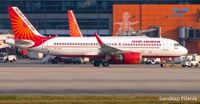NEW DELHI- Australian cricketer David Warner expressed frustration with Air India after a bizarre flight incident at Kempegowda International Airport in Bengaluru, where he found himself stranded onboard a plane that had no pilots. This incident, which unfolded amid severe weather disruptions on March 22, highlights the ongoing challenges passengers face in air travel, particularly during environmental adversities.
On that day, heavy rainfall and strong winds resulted in widespread delays and diversions for flights across the region, with 19 flights being diverted and over ten others delayed. This chaos on the ground significantly impacted operations at Bengaluru Airport, leading to palpable frustration among travelers. In response to this turmoil, Air India attributed the disruption to the adverse weather conditions affecting their crew's availability.
Warner, who took to social media platform X (formerly Twitter) to voice his complaints, questioned Air India’s judgment in boarding passengers without confirming the presence of pilots. “@airindia we’ve boarded a plane with no pilots and waiting on the plane for hours. Why would you board passengers knowing that you have no pilots for the flight?” he tweeted, inciting a wave of reactions from fellow travelers and aviation enthusiasts alike.
The airline responded to Warner’s outcry by explaining that the flight crew for Warner’s plane was delayed due to prior flight diversions, which were caused by the tumultuous weather conditions. “Dear Mr. Warner, today’s challenging weather in Bengaluru caused diversions and delays across all airlines. The crew operating your flight was held up on an earlier assignment affected by these disruptions, which led to a delay in departure. We appreciate your patience and thank you for choosing to fly with us,” Air India's statement read.
According to weather reports, Bengaluru experienced unpredictable weather patterns, with rainfall measuring about 3.6 mm recorded that day, along with thunderstorms that created chaos in air traffic control. The situation spiraled further, resulting in multiple flights being diverted to alternate airports, including those operated by IndiGo, Air India Express, and Akasa Air. Ground handling and rescheduling efforts were also noticeably impacted, leading to extended wait times for passengers.
This incident echoes similar criticisms levied against Air India by politicians and the public alike. Nationalist Congress Party leader Supriya Sule previously expressed her discontent with the airline’s chronic delays, suggesting that passengers paying premium fares deserve better. Taking to X, she noted, “Air India flights are endlessly delayed — this is unacceptable! We pay premium fares, yet flights are never on time. Professionals, children, and senior citizens — all affected by this constant mismanagement.” Sule called on Civil Aviation Minister Ram Mohan Naidu Kinjarapu to impose stricter regulations on airlines and to enhance service standards.
After Warner's incident, many began to question Air India's protocol, with users on X raising concerns about boarding practices without pilot confirmation. One user jokingly noted, “Classic airline response. You have not responded to the question he has raised. Why onboard people if you know there is a delay?” Another echoed, “Why make passengers board when pilots aren't there to fly the plane?!”
As the weather in Bengaluru worsened, reports of waterlogging in various city areas added to the commuter woes, making travel difficult both in the air and on the ground. It was a day that many travelers were forced to spend long hours at the airport, facing significant delays as airlines scrambled to adjust scheduling. The India Meteorological Department cited the storms as contributing factors not just to air travel inefficiencies, but also to traffic issues due to blocked roads and fallen trees.
Though rain often brings relief from the extreme heat typical of Indian summers, in this instance, it unveiled the vulnerabilities of air travel in the face of climate challenges. This situation with David Warner serves as a crucial reminder that airlines need to establish robust contingency plans capable of addressing operational issues that arise under unpredictable weather conditions. Such plans should include clear communication strategies that inform passengers about potential delays before boarding.
As passengers look for accountability and reliability from airlines, Air India, which is no stranger to complaints about delays and service issues, will need to take a hard look at its operational protocols. The need for transparency in customer service appears critical in restoring faith among its customers.
Ultimately, travelers should not have to endure the inconvenience of being made to wait in a plane without pilots present.David Warner's complaints resonate far beyond the realm of celebrity grievances; they echo the frustrations of everyday passengers who count on airlines to prioritize their safety and comfort. Only time will tell how Air India will respond and adapt to these ongoing challenges.









